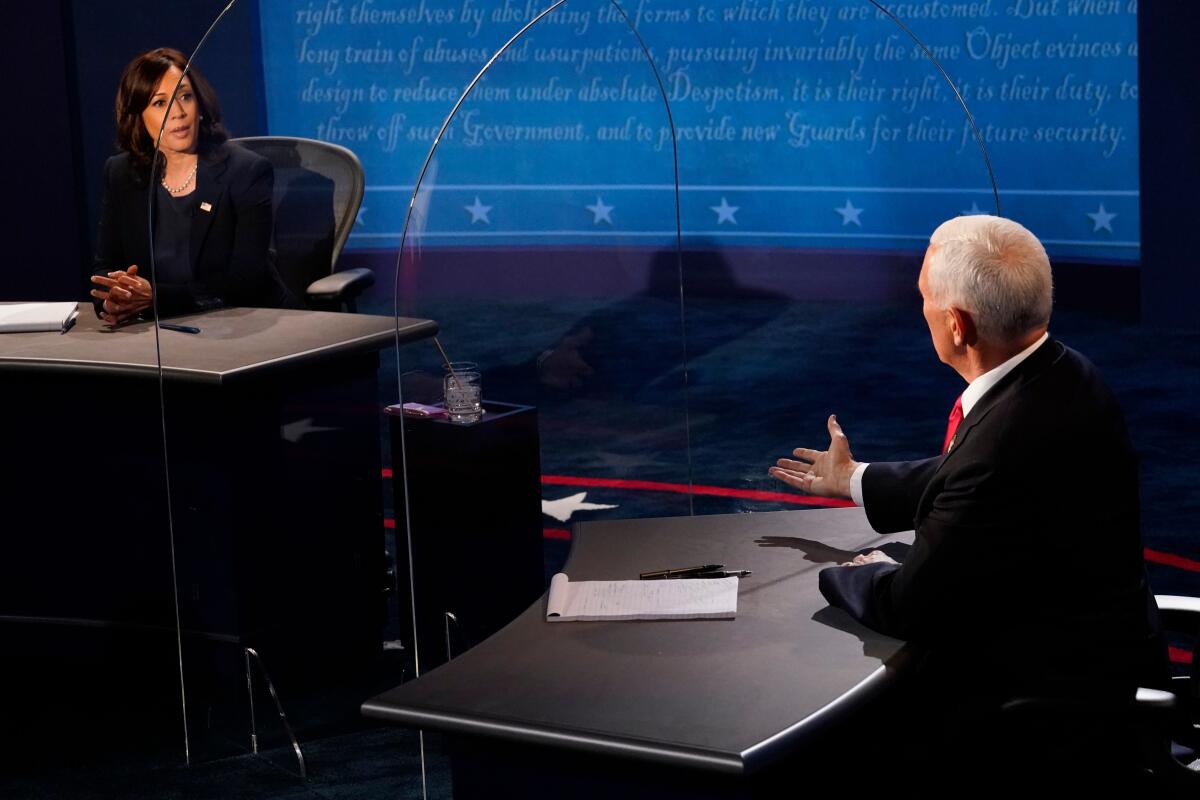Editorial: The Pence-Harris ‘debate’ was civil, contentious and not very enlightening

Vice President Mike Pence is no Donald Trump, which created a challenge for Sen. Kamala Harris in Wednesday’s debate in Salt Lake City. Unlike President Trump, who embarrassed himself and his party with his unhinged outbursts in his first debate with Joe Biden, Pence was generally civil and soft-spoken, although he repeatedly acted as if the rules didn’t apply to him either.
Pence also offered the defense of the administration’s policies — deceptive as it often was — that Trump was incapable of mounting. And he was relentless in pressing Harris when she dodged questions, though he was at least as evasive throughout.
But Harris effectively made what was probably the most important argument on her agenda: that the Trump administration had badly mismanaged the coronavirus outbreak and misled the American people about its seriousness.
“The American people have witnessed what is the greatest failure of any presidential administration in the history of our country,“ Harris said. “They knew what was happening and they didn’t tell you. They knew and they covered it up.” It was a predictable attack, but one that likely resonated with viewers who in recent days have witnessed Trump minimizing the danger posed by the virus even after he was infected by it.
Pence, whom Trump named to head the White House coronavirus task force, did his best to portray Trump as a president who resolutely responded to a public health threat, exaggerating the importance of Trump’s decision to shut off some travel from China in January. The Associated Press has reported that more than 8,000 Chinese and foreign nationals based in Hong Kong and Macao entered the U.S. in the three months after those restrictions were imposed.
Harris also effectively established that the Trump administration, while seeking a Supreme Court decision to have the Affordable Care Act struck down, has proposed no credible healthcare alternative for people not covered by an employer’s group health plan.
“If you have a preexisting condition — heart disease, diabetes, breast cancer — they’re coming for you,” Harris said. “If you love someone who has a preexisting condition, they’re coming for you. If you are under the age of 26 on your parents’ coverage, they’re coming for you.” For all his comforting cadences, Pence was unable to refute that powerful claim, though he insisted that “President Trump and I have a plan to improve healthcare and to protect preexisting conditions for every American.” Trump has been making some variation of that claim for years now, and no plan has yet appeared.
Although more civil and coherent than the presidential debate, Wednesday’s encounter was a frustrating spectacle for viewers. Both candidates repeatedly failed to answer questions and used their time to unpack prefabricated arguments.
Harris refused to say whether a Biden-Harris administration would attempt to enlarge the Supreme Court if the Senate confirmed Judge Amy Coney Barrett, Trump’s last-minute nominee to replace the late Justice Ruth Bader Ginsburg. Pence, while characterizing himself and Trump as “pro-life,” evaded a question from moderator Susan Page about what restrictions on abortion he would want to see his home state of Indiana to adopt if Roe vs. Wade were overruled. Both candidates failed to say whether they had discussed arrangements for assuming the president’s duties if their running mates were disabled.
The omissions and evasions were disappointing precisely because this vice presidential debate held unusual interest. When the candidates for president are both men in their 70s — and one, Trump, has been treated for COVID-19 — it’s natural that voters would pay unusual attention to the performance of their potential successors.
And even if the winner of this year’s election remains in good health over the next four years, both Pence and Harris are potential presidential nominees in 2024 — Pence because Trump would have served his second term; Harris because Biden, who will turn 82 that year, might well choose not to run again.
No one expected the sole vice presidential debate to sway the outcome of the election. But viewers were entitled to hear the candidates engage honestly with the questions put to them. At some point, the Commission on Presidential Debates is going to have to grapple with the failure of these exercises to enlighten voters about anything other than the candidates’ ability to deliver scripted talking points.
More to Read
A cure for the common opinion
Get thought-provoking perspectives with our weekly newsletter.
You may occasionally receive promotional content from the Los Angeles Times.










